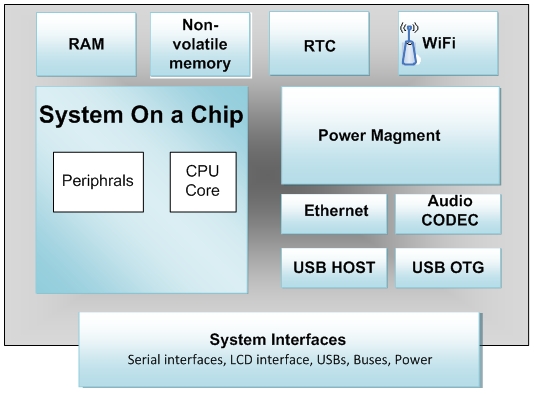System On a Module
System on Module (SOM) - is a type of a single-board computer (SBC), a subtype of an embedded computer system, as an extension of the concept of System on Chip (SoC) and lying between a full-up computer and a microcontroller in nature.
Variscite's SOMs are complete computers built on a single circuit board. The design is centered on a single microprocessor with RAM, input/output controllers and all other features needed to be a functional computer on the one board. However, unlike a single-board computer, the COM module will usually lack the standard connectors for any input/output peripherals to be attached directly to the board. Instead, the wiring for these peripherals are bussed out to connectors on the board.
The SOM requires to be mounted on a carrier board (or "baseboard") which breaks the bus out to standard peripheral connectors.
Variscite's SOMs offer a dense package computer system for use in small or specialized applications requiring low power consumption or small physical size as is needed in embedded systems
Variscite's SOMs are low-power, high performance System-on-Modules which serve as building blocks and easily integrate into any embedded solution. They include an extensive range of interfaces and communication protocols and are ready to run any embedded operating system such as Linux and Windows Embedded CE
Variscite SOMs are widely used in a variaty of industrial fields such as: Medical, Agriculture, Industrial computing, Military and consumer products.
SOM's advantages in production:
Hardware
| Design Challenges & Resources | SOM Integration | MCU Integration |
|---|---|---|
| Documentation | Simplified Data Sheet | Complex documentation |
| Reference Design | Simple, cost-sensitive, smaller real-estate, ORCAD DSN format Design review – Variscite offers schematic review for each of its customers. |
Available |
| Design Flexibility | Medium | High |
| Design Complexity | Low | High – DDR interface, power management ..etc. |
| Layout |
Simple BaseBoard layout 4-6 layers, no micro-vias required, Signal integrity of DDRs done on SOM-> lower risk and cost |
Complex (DDRs, Complex power lines..) Micro vias in large size PCBs -> high cost Signal integrity done by customer |
| Bring Up | Short Process, focus in application specific peripherals. | Long HW -SW integration process of basic MCU peripherals. |
| Hardware upgrades (CPU Speed, memory Size) | Variscite SOMs are pin-2-pin compatible -> Replacing SOM | Full project re-spin. |
Software
| Design Challenges & Resources | SOM Integration | MCU Integration |
|---|---|---|
| Device Drivers | Rich feature set, proven, device drivers for all common peripherals tested by over 100 customers | Device drive modifications required, long debug & QA process. |
| Software Features | Unique features such as: Remote software upgrades, manufacturing servers for concurrent burning at production,…etc | Poor basic features supplied by IC vendor. |
| Software upgrades, BSP maintenance. | Free | Costly design process |
System
| Design Challenges & Resources | SOM Integration | MCU Integration |
|---|---|---|
| NRE costs | Low | High |
| Time to market | Fast | Slow |
| Design Risks | Low | High |
| Future System upgrade / cost reduction | Drop-in alternative SOMs | Full project re-spin |
